Graduate Diploma DAM792 Report: Abel Tasman Kayaks Sustainability
VerifiedAdded on 2023/01/17
|24
|4759
|55
Report
AI Summary
This report provides a detailed overview of Abel Tasman Kayaks, a sea kayaking company operating in Abel Tasman National Park, New Zealand. It begins with an executive summary, followed by an organizational overview and a literature review on the concept of sustainability, including its economic, environmental, and socio-political dimensions. The report analyzes the New Zealand Tourism Sustainability Commitment, its four key goals (economic, visitor, host community, and environmental sustainability), and its 14 commitments. It critically evaluates sustainability approaches within the tourism industry, specifically focusing on Abel Tasman Kayaks' practices. The report assesses the company's performance across the four sustainability goals, offering recommendations for improvement in each area to enhance its commitment to sustainable tourism. The report emphasizes the importance of responsible practices to ensure the quality of life for local communities and the preservation of the environment for future travelers.

Paraphrase This Document
Need a fresh take? Get an instant paraphrase of this document with our AI Paraphraser
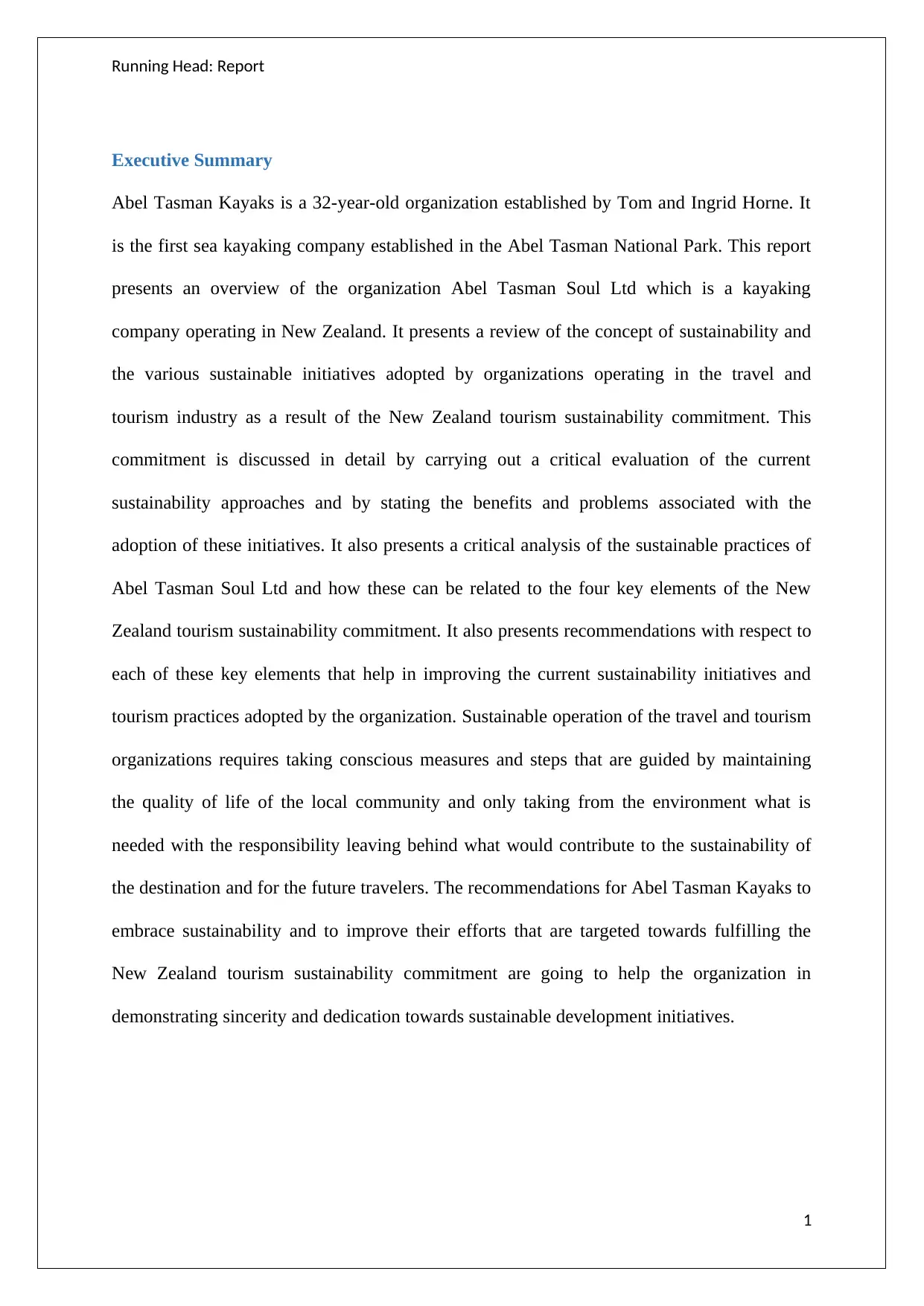
Running Head: Report
Executive Summary
Abel Tasman Kayaks is a 32-year-old organization established by Tom and Ingrid Horne. It
is the first sea kayaking company established in the Abel Tasman National Park. This report
presents an overview of the organization Abel Tasman Soul Ltd which is a kayaking
company operating in New Zealand. It presents a review of the concept of sustainability and
the various sustainable initiatives adopted by organizations operating in the travel and
tourism industry as a result of the New Zealand tourism sustainability commitment. This
commitment is discussed in detail by carrying out a critical evaluation of the current
sustainability approaches and by stating the benefits and problems associated with the
adoption of these initiatives. It also presents a critical analysis of the sustainable practices of
Abel Tasman Soul Ltd and how these can be related to the four key elements of the New
Zealand tourism sustainability commitment. It also presents recommendations with respect to
each of these key elements that help in improving the current sustainability initiatives and
tourism practices adopted by the organization. Sustainable operation of the travel and tourism
organizations requires taking conscious measures and steps that are guided by maintaining
the quality of life of the local community and only taking from the environment what is
needed with the responsibility leaving behind what would contribute to the sustainability of
the destination and for the future travelers. The recommendations for Abel Tasman Kayaks to
embrace sustainability and to improve their efforts that are targeted towards fulfilling the
New Zealand tourism sustainability commitment are going to help the organization in
demonstrating sincerity and dedication towards sustainable development initiatives.
1
Executive Summary
Abel Tasman Kayaks is a 32-year-old organization established by Tom and Ingrid Horne. It
is the first sea kayaking company established in the Abel Tasman National Park. This report
presents an overview of the organization Abel Tasman Soul Ltd which is a kayaking
company operating in New Zealand. It presents a review of the concept of sustainability and
the various sustainable initiatives adopted by organizations operating in the travel and
tourism industry as a result of the New Zealand tourism sustainability commitment. This
commitment is discussed in detail by carrying out a critical evaluation of the current
sustainability approaches and by stating the benefits and problems associated with the
adoption of these initiatives. It also presents a critical analysis of the sustainable practices of
Abel Tasman Soul Ltd and how these can be related to the four key elements of the New
Zealand tourism sustainability commitment. It also presents recommendations with respect to
each of these key elements that help in improving the current sustainability initiatives and
tourism practices adopted by the organization. Sustainable operation of the travel and tourism
organizations requires taking conscious measures and steps that are guided by maintaining
the quality of life of the local community and only taking from the environment what is
needed with the responsibility leaving behind what would contribute to the sustainability of
the destination and for the future travelers. The recommendations for Abel Tasman Kayaks to
embrace sustainability and to improve their efforts that are targeted towards fulfilling the
New Zealand tourism sustainability commitment are going to help the organization in
demonstrating sincerity and dedication towards sustainable development initiatives.
1
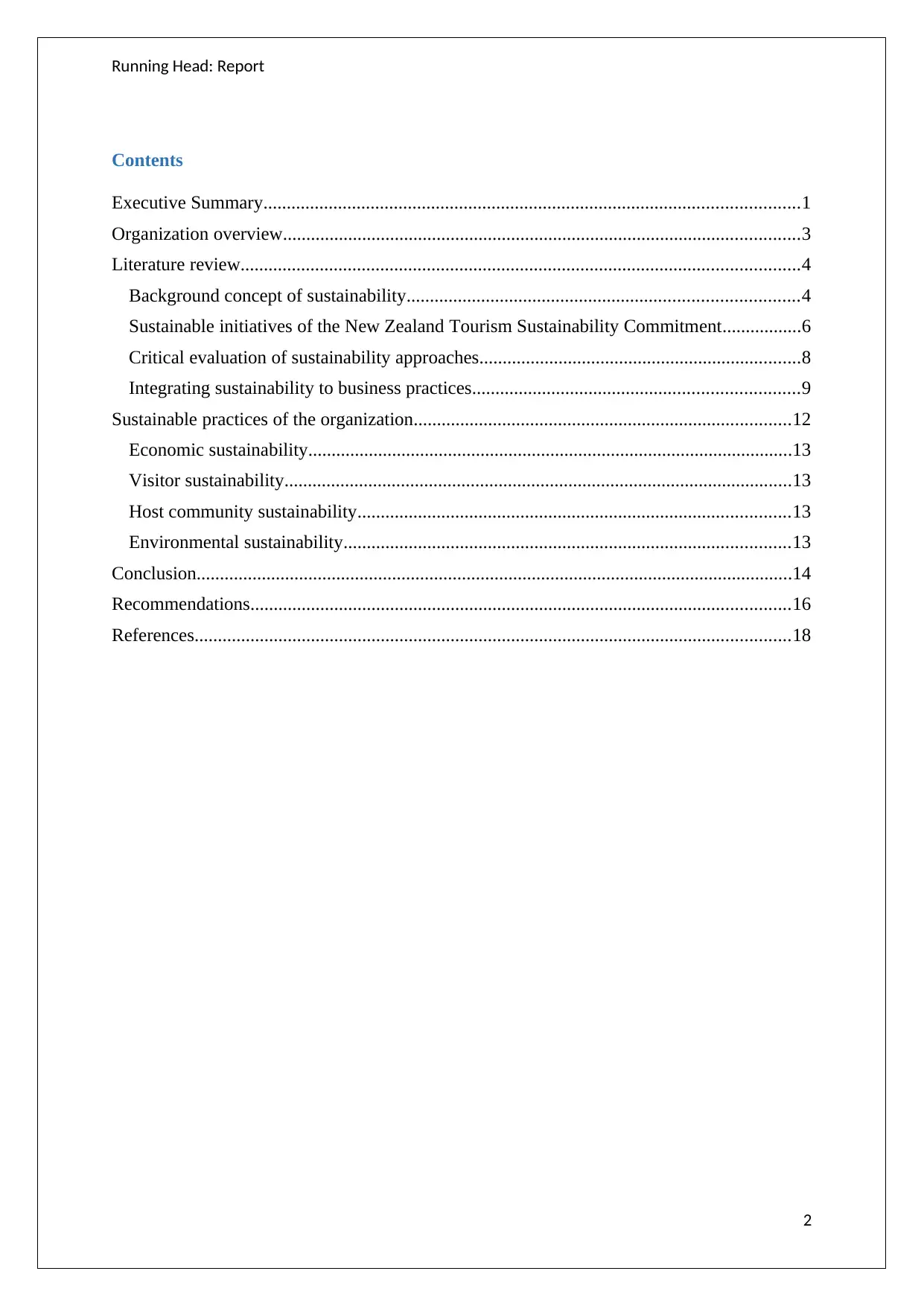
Running Head: Report
Contents
Executive Summary...................................................................................................................1
Organization overview...............................................................................................................3
Literature review........................................................................................................................4
Background concept of sustainability....................................................................................4
Sustainable initiatives of the New Zealand Tourism Sustainability Commitment.................6
Critical evaluation of sustainability approaches.....................................................................8
Integrating sustainability to business practices......................................................................9
Sustainable practices of the organization.................................................................................12
Economic sustainability........................................................................................................13
Visitor sustainability.............................................................................................................13
Host community sustainability.............................................................................................13
Environmental sustainability................................................................................................13
Conclusion................................................................................................................................14
Recommendations....................................................................................................................16
References................................................................................................................................18
2
Contents
Executive Summary...................................................................................................................1
Organization overview...............................................................................................................3
Literature review........................................................................................................................4
Background concept of sustainability....................................................................................4
Sustainable initiatives of the New Zealand Tourism Sustainability Commitment.................6
Critical evaluation of sustainability approaches.....................................................................8
Integrating sustainability to business practices......................................................................9
Sustainable practices of the organization.................................................................................12
Economic sustainability........................................................................................................13
Visitor sustainability.............................................................................................................13
Host community sustainability.............................................................................................13
Environmental sustainability................................................................................................13
Conclusion................................................................................................................................14
Recommendations....................................................................................................................16
References................................................................................................................................18
2
⊘ This is a preview!⊘
Do you want full access?
Subscribe today to unlock all pages.

Trusted by 1+ million students worldwide
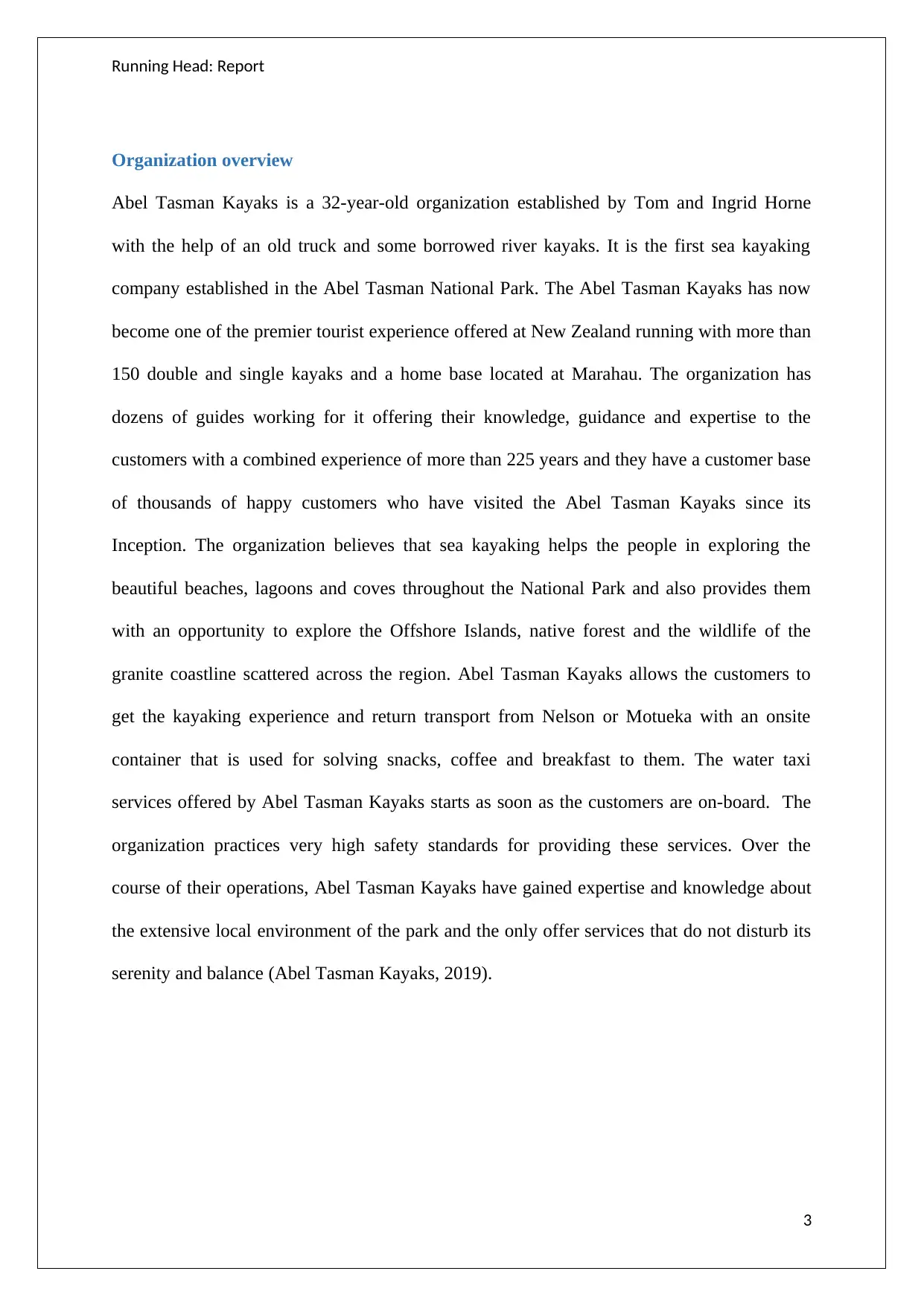
Running Head: Report
Organization overview
Abel Tasman Kayaks is a 32-year-old organization established by Tom and Ingrid Horne
with the help of an old truck and some borrowed river kayaks. It is the first sea kayaking
company established in the Abel Tasman National Park. The Abel Tasman Kayaks has now
become one of the premier tourist experience offered at New Zealand running with more than
150 double and single kayaks and a home base located at Marahau. The organization has
dozens of guides working for it offering their knowledge, guidance and expertise to the
customers with a combined experience of more than 225 years and they have a customer base
of thousands of happy customers who have visited the Abel Tasman Kayaks since its
Inception. The organization believes that sea kayaking helps the people in exploring the
beautiful beaches, lagoons and coves throughout the National Park and also provides them
with an opportunity to explore the Offshore Islands, native forest and the wildlife of the
granite coastline scattered across the region. Abel Tasman Kayaks allows the customers to
get the kayaking experience and return transport from Nelson or Motueka with an onsite
container that is used for solving snacks, coffee and breakfast to them. The water taxi
services offered by Abel Tasman Kayaks starts as soon as the customers are on-board. The
organization practices very high safety standards for providing these services. Over the
course of their operations, Abel Tasman Kayaks have gained expertise and knowledge about
the extensive local environment of the park and the only offer services that do not disturb its
serenity and balance (Abel Tasman Kayaks, 2019).
3
Organization overview
Abel Tasman Kayaks is a 32-year-old organization established by Tom and Ingrid Horne
with the help of an old truck and some borrowed river kayaks. It is the first sea kayaking
company established in the Abel Tasman National Park. The Abel Tasman Kayaks has now
become one of the premier tourist experience offered at New Zealand running with more than
150 double and single kayaks and a home base located at Marahau. The organization has
dozens of guides working for it offering their knowledge, guidance and expertise to the
customers with a combined experience of more than 225 years and they have a customer base
of thousands of happy customers who have visited the Abel Tasman Kayaks since its
Inception. The organization believes that sea kayaking helps the people in exploring the
beautiful beaches, lagoons and coves throughout the National Park and also provides them
with an opportunity to explore the Offshore Islands, native forest and the wildlife of the
granite coastline scattered across the region. Abel Tasman Kayaks allows the customers to
get the kayaking experience and return transport from Nelson or Motueka with an onsite
container that is used for solving snacks, coffee and breakfast to them. The water taxi
services offered by Abel Tasman Kayaks starts as soon as the customers are on-board. The
organization practices very high safety standards for providing these services. Over the
course of their operations, Abel Tasman Kayaks have gained expertise and knowledge about
the extensive local environment of the park and the only offer services that do not disturb its
serenity and balance (Abel Tasman Kayaks, 2019).
3
Paraphrase This Document
Need a fresh take? Get an instant paraphrase of this document with our AI Paraphraser
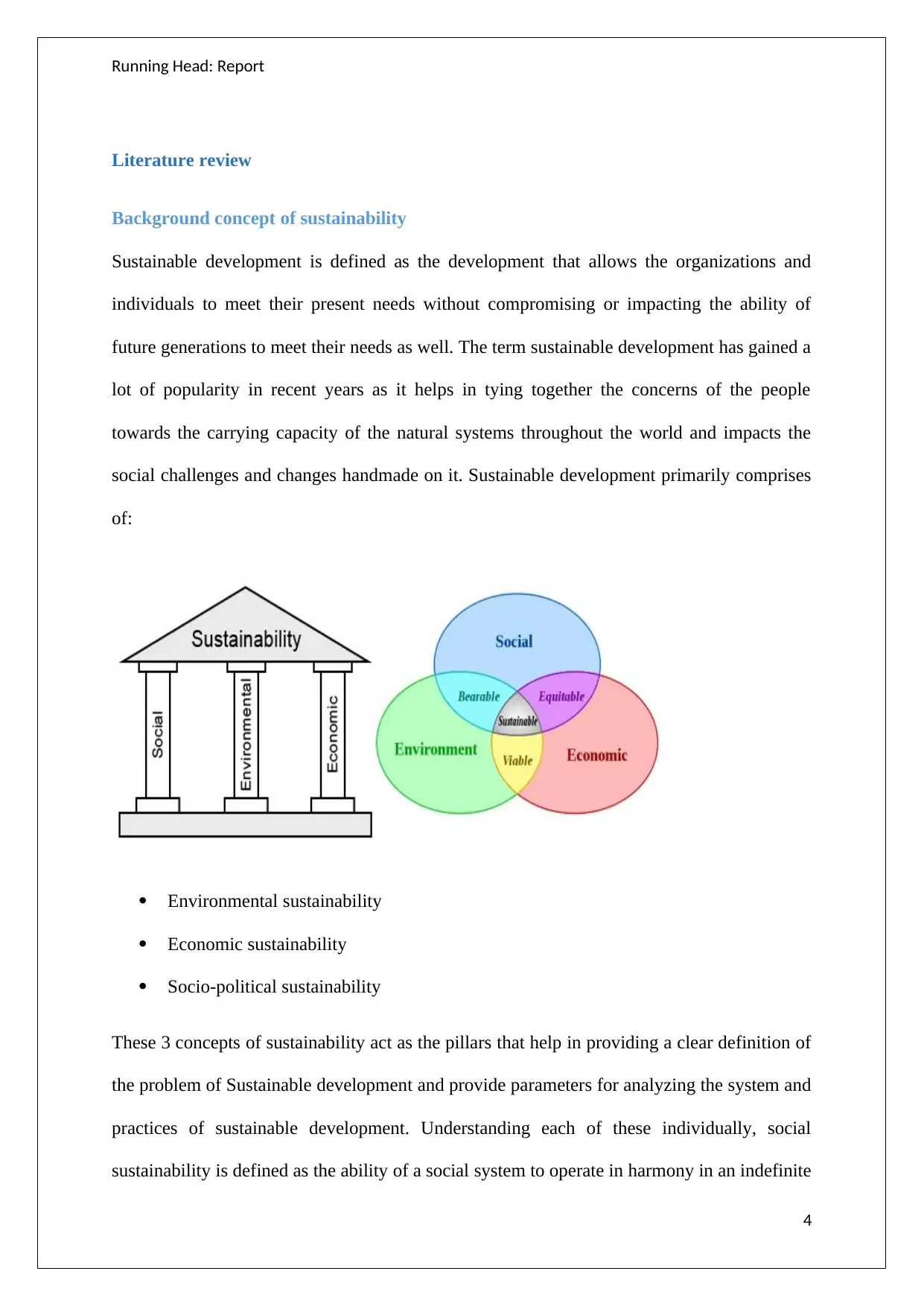
Running Head: Report
Literature review
Background concept of sustainability
Sustainable development is defined as the development that allows the organizations and
individuals to meet their present needs without compromising or impacting the ability of
future generations to meet their needs as well. The term sustainable development has gained a
lot of popularity in recent years as it helps in tying together the concerns of the people
towards the carrying capacity of the natural systems throughout the world and impacts the
social challenges and changes handmade on it. Sustainable development primarily comprises
of:
Environmental sustainability
Economic sustainability
Socio-political sustainability
These 3 concepts of sustainability act as the pillars that help in providing a clear definition of
the problem of Sustainable development and provide parameters for analyzing the system and
practices of sustainable development. Understanding each of these individually, social
sustainability is defined as the ability of a social system to operate in harmony in an indefinite
4
Literature review
Background concept of sustainability
Sustainable development is defined as the development that allows the organizations and
individuals to meet their present needs without compromising or impacting the ability of
future generations to meet their needs as well. The term sustainable development has gained a
lot of popularity in recent years as it helps in tying together the concerns of the people
towards the carrying capacity of the natural systems throughout the world and impacts the
social challenges and changes handmade on it. Sustainable development primarily comprises
of:
Environmental sustainability
Economic sustainability
Socio-political sustainability
These 3 concepts of sustainability act as the pillars that help in providing a clear definition of
the problem of Sustainable development and provide parameters for analyzing the system and
practices of sustainable development. Understanding each of these individually, social
sustainability is defined as the ability of a social system to operate in harmony in an indefinite
4
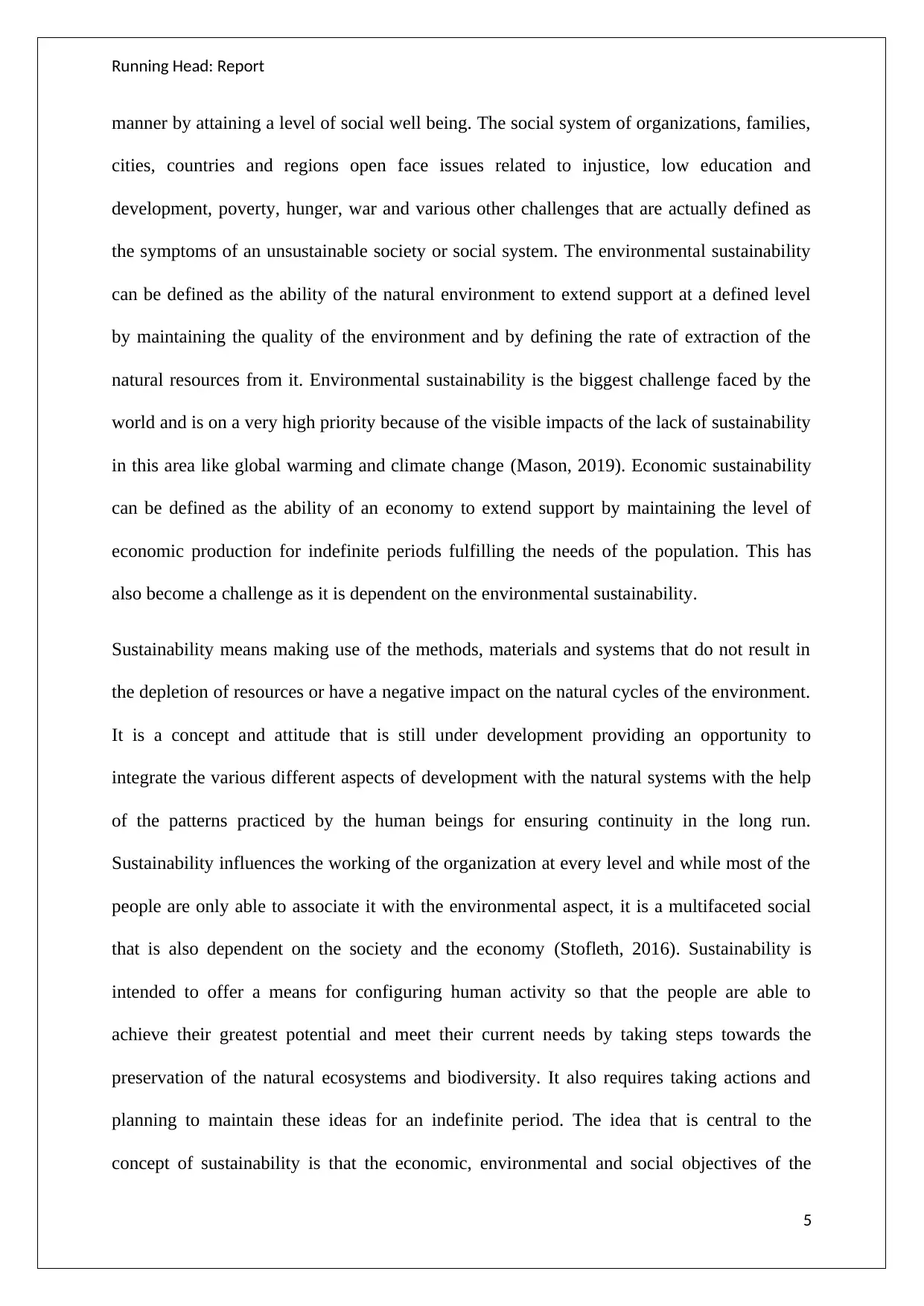
Running Head: Report
manner by attaining a level of social well being. The social system of organizations, families,
cities, countries and regions open face issues related to injustice, low education and
development, poverty, hunger, war and various other challenges that are actually defined as
the symptoms of an unsustainable society or social system. The environmental sustainability
can be defined as the ability of the natural environment to extend support at a defined level
by maintaining the quality of the environment and by defining the rate of extraction of the
natural resources from it. Environmental sustainability is the biggest challenge faced by the
world and is on a very high priority because of the visible impacts of the lack of sustainability
in this area like global warming and climate change (Mason, 2019). Economic sustainability
can be defined as the ability of an economy to extend support by maintaining the level of
economic production for indefinite periods fulfilling the needs of the population. This has
also become a challenge as it is dependent on the environmental sustainability.
Sustainability means making use of the methods, materials and systems that do not result in
the depletion of resources or have a negative impact on the natural cycles of the environment.
It is a concept and attitude that is still under development providing an opportunity to
integrate the various different aspects of development with the natural systems with the help
of the patterns practiced by the human beings for ensuring continuity in the long run.
Sustainability influences the working of the organization at every level and while most of the
people are only able to associate it with the environmental aspect, it is a multifaceted social
that is also dependent on the society and the economy (Stofleth, 2016). Sustainability is
intended to offer a means for configuring human activity so that the people are able to
achieve their greatest potential and meet their current needs by taking steps towards the
preservation of the natural ecosystems and biodiversity. It also requires taking actions and
planning to maintain these ideas for an indefinite period. The idea that is central to the
concept of sustainability is that the economic, environmental and social objectives of the
5
manner by attaining a level of social well being. The social system of organizations, families,
cities, countries and regions open face issues related to injustice, low education and
development, poverty, hunger, war and various other challenges that are actually defined as
the symptoms of an unsustainable society or social system. The environmental sustainability
can be defined as the ability of the natural environment to extend support at a defined level
by maintaining the quality of the environment and by defining the rate of extraction of the
natural resources from it. Environmental sustainability is the biggest challenge faced by the
world and is on a very high priority because of the visible impacts of the lack of sustainability
in this area like global warming and climate change (Mason, 2019). Economic sustainability
can be defined as the ability of an economy to extend support by maintaining the level of
economic production for indefinite periods fulfilling the needs of the population. This has
also become a challenge as it is dependent on the environmental sustainability.
Sustainability means making use of the methods, materials and systems that do not result in
the depletion of resources or have a negative impact on the natural cycles of the environment.
It is a concept and attitude that is still under development providing an opportunity to
integrate the various different aspects of development with the natural systems with the help
of the patterns practiced by the human beings for ensuring continuity in the long run.
Sustainability influences the working of the organization at every level and while most of the
people are only able to associate it with the environmental aspect, it is a multifaceted social
that is also dependent on the society and the economy (Stofleth, 2016). Sustainability is
intended to offer a means for configuring human activity so that the people are able to
achieve their greatest potential and meet their current needs by taking steps towards the
preservation of the natural ecosystems and biodiversity. It also requires taking actions and
planning to maintain these ideas for an indefinite period. The idea that is central to the
concept of sustainability is that the economic, environmental and social objectives of the
5
⊘ This is a preview!⊘
Do you want full access?
Subscribe today to unlock all pages.

Trusted by 1+ million students worldwide
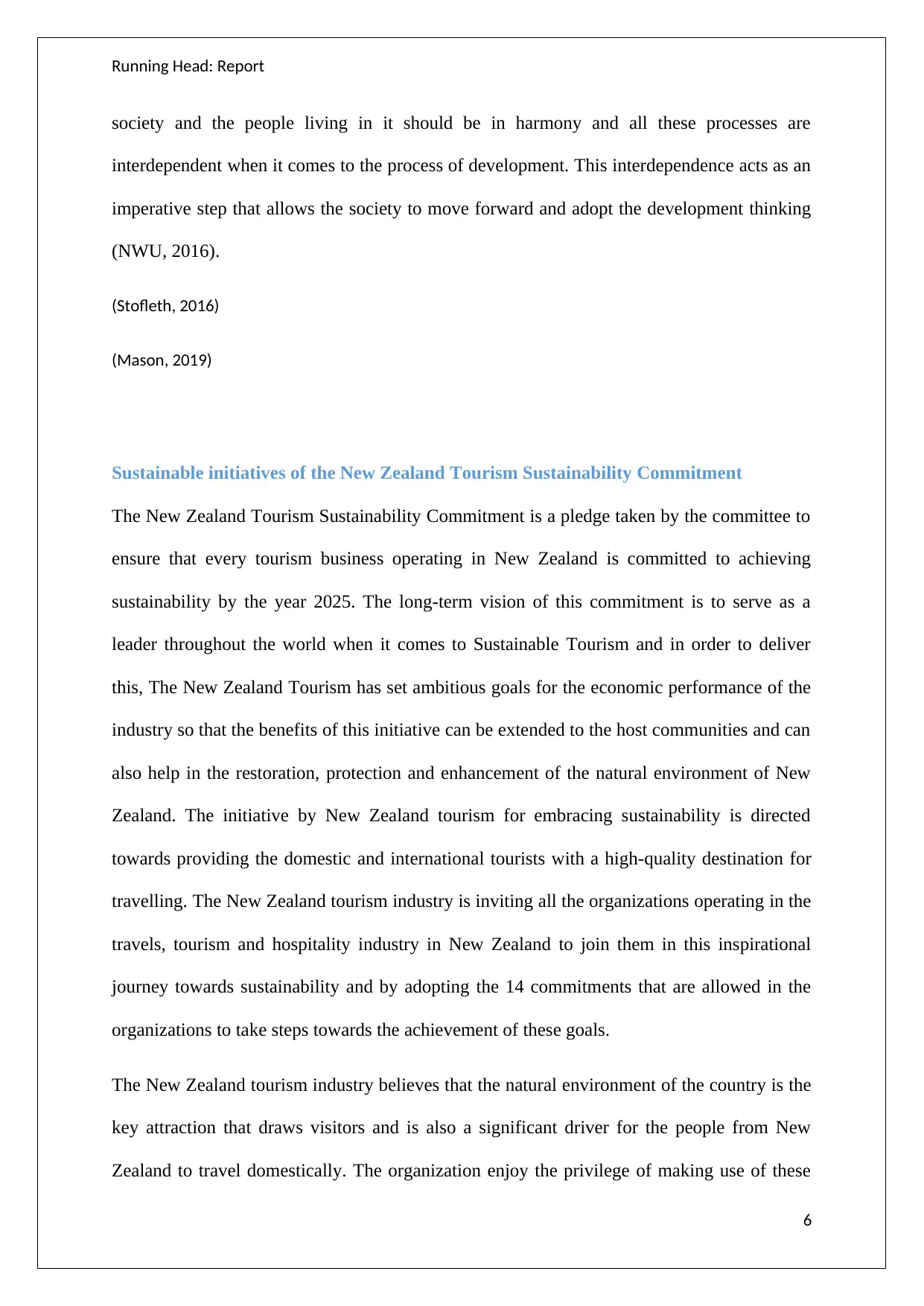
Running Head: Report
society and the people living in it should be in harmony and all these processes are
interdependent when it comes to the process of development. This interdependence acts as an
imperative step that allows the society to move forward and adopt the development thinking
(NWU, 2016).
(Stofleth, 2016)
(Mason, 2019)
Sustainable initiatives of the New Zealand Tourism Sustainability Commitment
The New Zealand Tourism Sustainability Commitment is a pledge taken by the committee to
ensure that every tourism business operating in New Zealand is committed to achieving
sustainability by the year 2025. The long-term vision of this commitment is to serve as a
leader throughout the world when it comes to Sustainable Tourism and in order to deliver
this, The New Zealand Tourism has set ambitious goals for the economic performance of the
industry so that the benefits of this initiative can be extended to the host communities and can
also help in the restoration, protection and enhancement of the natural environment of New
Zealand. The initiative by New Zealand tourism for embracing sustainability is directed
towards providing the domestic and international tourists with a high-quality destination for
travelling. The New Zealand tourism industry is inviting all the organizations operating in the
travels, tourism and hospitality industry in New Zealand to join them in this inspirational
journey towards sustainability and by adopting the 14 commitments that are allowed in the
organizations to take steps towards the achievement of these goals.
The New Zealand tourism industry believes that the natural environment of the country is the
key attraction that draws visitors and is also a significant driver for the people from New
Zealand to travel domestically. The organization enjoy the privilege of making use of these
6
society and the people living in it should be in harmony and all these processes are
interdependent when it comes to the process of development. This interdependence acts as an
imperative step that allows the society to move forward and adopt the development thinking
(NWU, 2016).
(Stofleth, 2016)
(Mason, 2019)
Sustainable initiatives of the New Zealand Tourism Sustainability Commitment
The New Zealand Tourism Sustainability Commitment is a pledge taken by the committee to
ensure that every tourism business operating in New Zealand is committed to achieving
sustainability by the year 2025. The long-term vision of this commitment is to serve as a
leader throughout the world when it comes to Sustainable Tourism and in order to deliver
this, The New Zealand Tourism has set ambitious goals for the economic performance of the
industry so that the benefits of this initiative can be extended to the host communities and can
also help in the restoration, protection and enhancement of the natural environment of New
Zealand. The initiative by New Zealand tourism for embracing sustainability is directed
towards providing the domestic and international tourists with a high-quality destination for
travelling. The New Zealand tourism industry is inviting all the organizations operating in the
travels, tourism and hospitality industry in New Zealand to join them in this inspirational
journey towards sustainability and by adopting the 14 commitments that are allowed in the
organizations to take steps towards the achievement of these goals.
The New Zealand tourism industry believes that the natural environment of the country is the
key attraction that draws visitors and is also a significant driver for the people from New
Zealand to travel domestically. The organization enjoy the privilege of making use of these
6
Paraphrase This Document
Need a fresh take? Get an instant paraphrase of this document with our AI Paraphraser
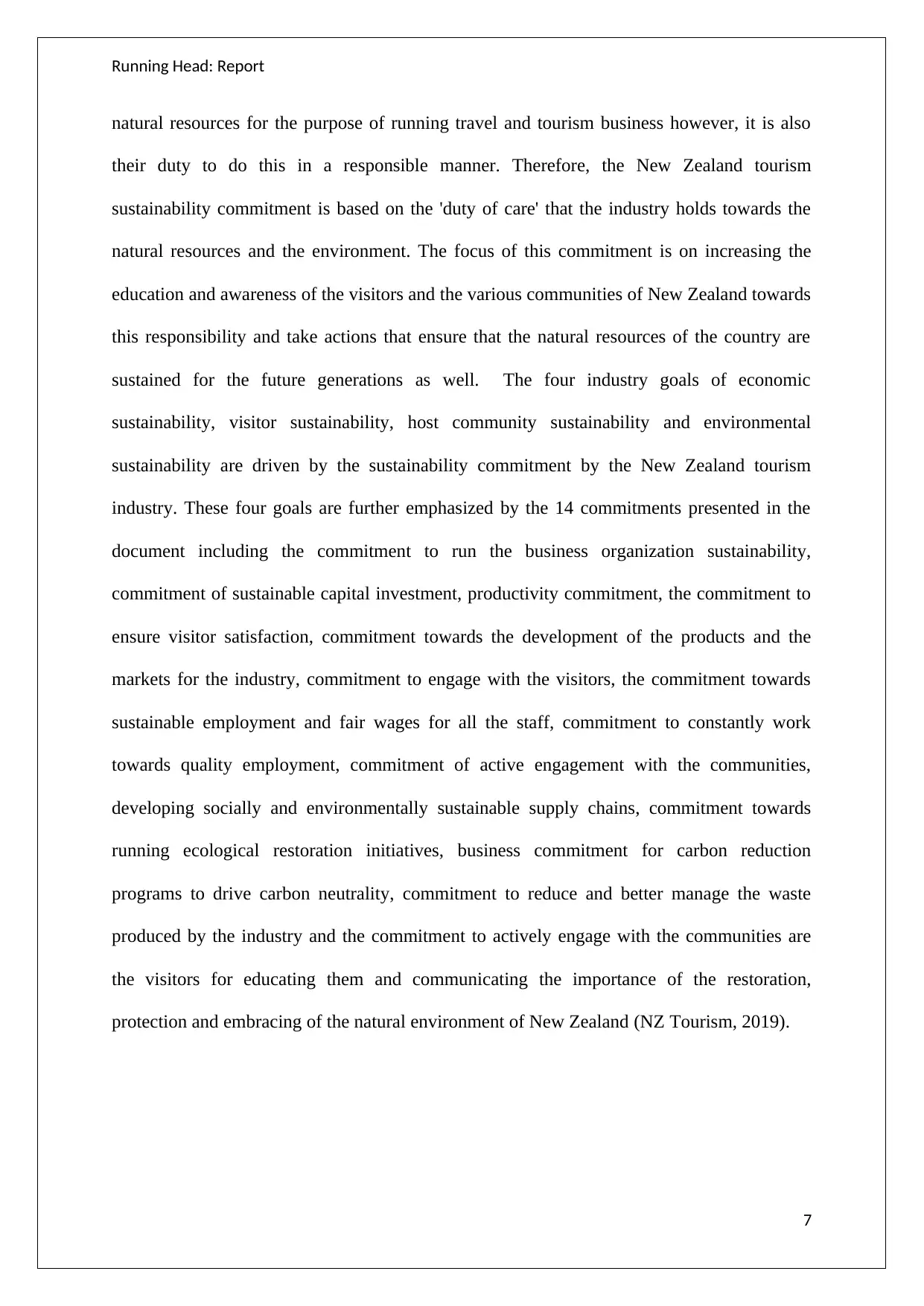
Running Head: Report
natural resources for the purpose of running travel and tourism business however, it is also
their duty to do this in a responsible manner. Therefore, the New Zealand tourism
sustainability commitment is based on the 'duty of care' that the industry holds towards the
natural resources and the environment. The focus of this commitment is on increasing the
education and awareness of the visitors and the various communities of New Zealand towards
this responsibility and take actions that ensure that the natural resources of the country are
sustained for the future generations as well. The four industry goals of economic
sustainability, visitor sustainability, host community sustainability and environmental
sustainability are driven by the sustainability commitment by the New Zealand tourism
industry. These four goals are further emphasized by the 14 commitments presented in the
document including the commitment to run the business organization sustainability,
commitment of sustainable capital investment, productivity commitment, the commitment to
ensure visitor satisfaction, commitment towards the development of the products and the
markets for the industry, commitment to engage with the visitors, the commitment towards
sustainable employment and fair wages for all the staff, commitment to constantly work
towards quality employment, commitment of active engagement with the communities,
developing socially and environmentally sustainable supply chains, commitment towards
running ecological restoration initiatives, business commitment for carbon reduction
programs to drive carbon neutrality, commitment to reduce and better manage the waste
produced by the industry and the commitment to actively engage with the communities are
the visitors for educating them and communicating the importance of the restoration,
protection and embracing of the natural environment of New Zealand (NZ Tourism, 2019).
7
natural resources for the purpose of running travel and tourism business however, it is also
their duty to do this in a responsible manner. Therefore, the New Zealand tourism
sustainability commitment is based on the 'duty of care' that the industry holds towards the
natural resources and the environment. The focus of this commitment is on increasing the
education and awareness of the visitors and the various communities of New Zealand towards
this responsibility and take actions that ensure that the natural resources of the country are
sustained for the future generations as well. The four industry goals of economic
sustainability, visitor sustainability, host community sustainability and environmental
sustainability are driven by the sustainability commitment by the New Zealand tourism
industry. These four goals are further emphasized by the 14 commitments presented in the
document including the commitment to run the business organization sustainability,
commitment of sustainable capital investment, productivity commitment, the commitment to
ensure visitor satisfaction, commitment towards the development of the products and the
markets for the industry, commitment to engage with the visitors, the commitment towards
sustainable employment and fair wages for all the staff, commitment to constantly work
towards quality employment, commitment of active engagement with the communities,
developing socially and environmentally sustainable supply chains, commitment towards
running ecological restoration initiatives, business commitment for carbon reduction
programs to drive carbon neutrality, commitment to reduce and better manage the waste
produced by the industry and the commitment to actively engage with the communities are
the visitors for educating them and communicating the importance of the restoration,
protection and embracing of the natural environment of New Zealand (NZ Tourism, 2019).
7
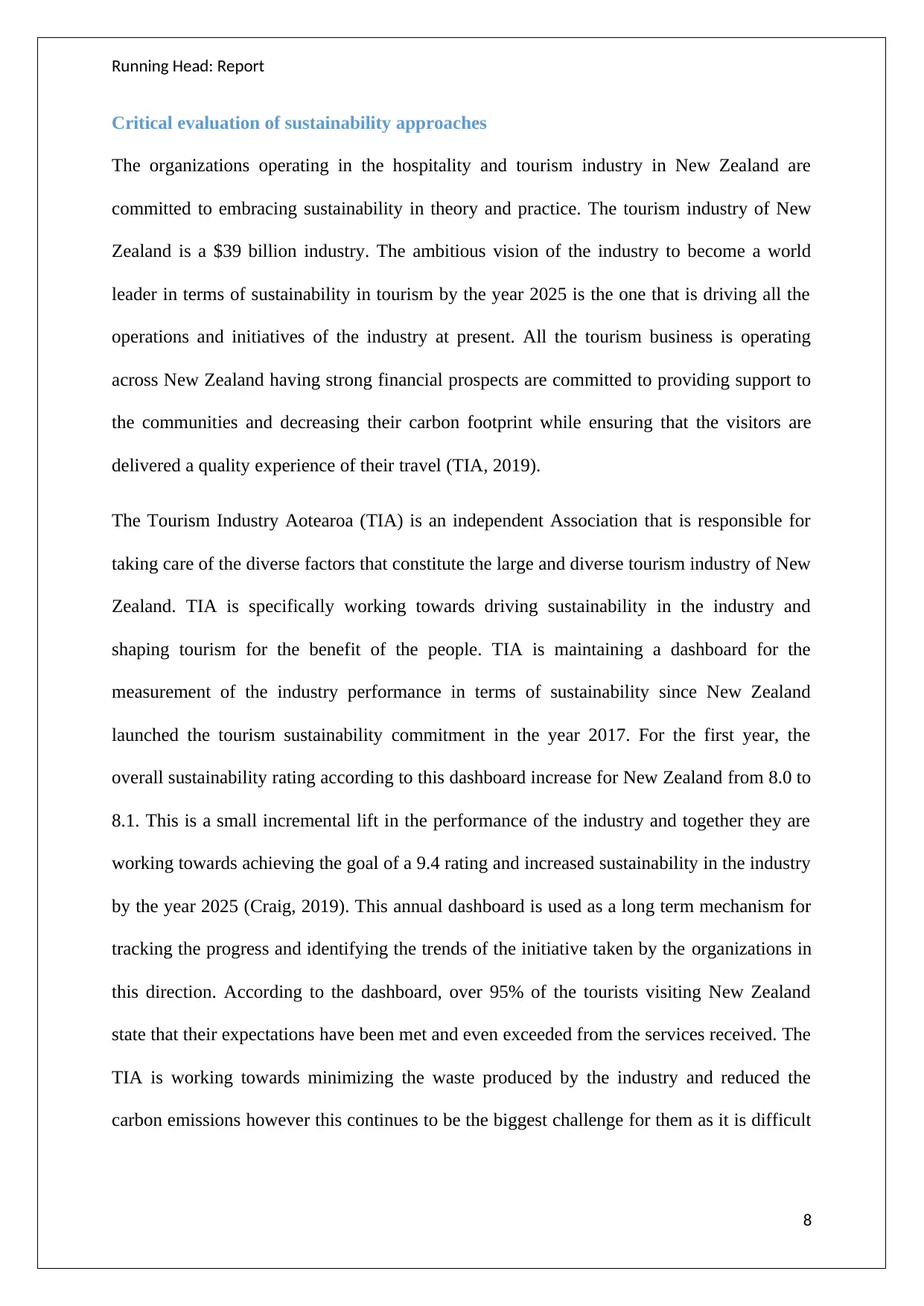
Running Head: Report
Critical evaluation of sustainability approaches
The organizations operating in the hospitality and tourism industry in New Zealand are
committed to embracing sustainability in theory and practice. The tourism industry of New
Zealand is a $39 billion industry. The ambitious vision of the industry to become a world
leader in terms of sustainability in tourism by the year 2025 is the one that is driving all the
operations and initiatives of the industry at present. All the tourism business is operating
across New Zealand having strong financial prospects are committed to providing support to
the communities and decreasing their carbon footprint while ensuring that the visitors are
delivered a quality experience of their travel (TIA, 2019).
The Tourism Industry Aotearoa (TIA) is an independent Association that is responsible for
taking care of the diverse factors that constitute the large and diverse tourism industry of New
Zealand. TIA is specifically working towards driving sustainability in the industry and
shaping tourism for the benefit of the people. TIA is maintaining a dashboard for the
measurement of the industry performance in terms of sustainability since New Zealand
launched the tourism sustainability commitment in the year 2017. For the first year, the
overall sustainability rating according to this dashboard increase for New Zealand from 8.0 to
8.1. This is a small incremental lift in the performance of the industry and together they are
working towards achieving the goal of a 9.4 rating and increased sustainability in the industry
by the year 2025 (Craig, 2019). This annual dashboard is used as a long term mechanism for
tracking the progress and identifying the trends of the initiative taken by the organizations in
this direction. According to the dashboard, over 95% of the tourists visiting New Zealand
state that their expectations have been met and even exceeded from the services received. The
TIA is working towards minimizing the waste produced by the industry and reduced the
carbon emissions however this continues to be the biggest challenge for them as it is difficult
8
Critical evaluation of sustainability approaches
The organizations operating in the hospitality and tourism industry in New Zealand are
committed to embracing sustainability in theory and practice. The tourism industry of New
Zealand is a $39 billion industry. The ambitious vision of the industry to become a world
leader in terms of sustainability in tourism by the year 2025 is the one that is driving all the
operations and initiatives of the industry at present. All the tourism business is operating
across New Zealand having strong financial prospects are committed to providing support to
the communities and decreasing their carbon footprint while ensuring that the visitors are
delivered a quality experience of their travel (TIA, 2019).
The Tourism Industry Aotearoa (TIA) is an independent Association that is responsible for
taking care of the diverse factors that constitute the large and diverse tourism industry of New
Zealand. TIA is specifically working towards driving sustainability in the industry and
shaping tourism for the benefit of the people. TIA is maintaining a dashboard for the
measurement of the industry performance in terms of sustainability since New Zealand
launched the tourism sustainability commitment in the year 2017. For the first year, the
overall sustainability rating according to this dashboard increase for New Zealand from 8.0 to
8.1. This is a small incremental lift in the performance of the industry and together they are
working towards achieving the goal of a 9.4 rating and increased sustainability in the industry
by the year 2025 (Craig, 2019). This annual dashboard is used as a long term mechanism for
tracking the progress and identifying the trends of the initiative taken by the organizations in
this direction. According to the dashboard, over 95% of the tourists visiting New Zealand
state that their expectations have been met and even exceeded from the services received. The
TIA is working towards minimizing the waste produced by the industry and reduced the
carbon emissions however this continues to be the biggest challenge for them as it is difficult
8
⊘ This is a preview!⊘
Do you want full access?
Subscribe today to unlock all pages.

Trusted by 1+ million students worldwide
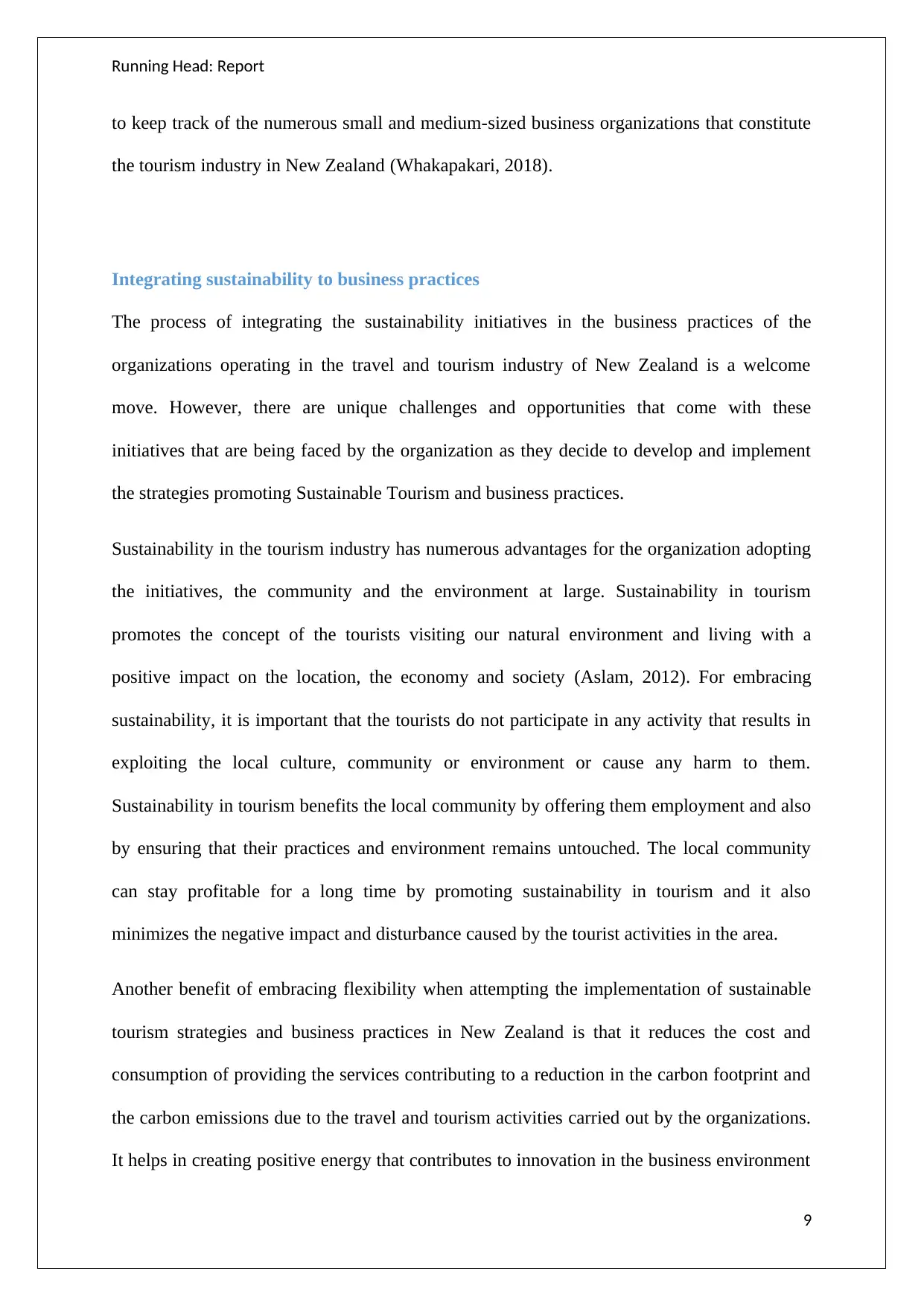
Running Head: Report
to keep track of the numerous small and medium-sized business organizations that constitute
the tourism industry in New Zealand (Whakapakari, 2018).
Integrating sustainability to business practices
The process of integrating the sustainability initiatives in the business practices of the
organizations operating in the travel and tourism industry of New Zealand is a welcome
move. However, there are unique challenges and opportunities that come with these
initiatives that are being faced by the organization as they decide to develop and implement
the strategies promoting Sustainable Tourism and business practices.
Sustainability in the tourism industry has numerous advantages for the organization adopting
the initiatives, the community and the environment at large. Sustainability in tourism
promotes the concept of the tourists visiting our natural environment and living with a
positive impact on the location, the economy and society (Aslam, 2012). For embracing
sustainability, it is important that the tourists do not participate in any activity that results in
exploiting the local culture, community or environment or cause any harm to them.
Sustainability in tourism benefits the local community by offering them employment and also
by ensuring that their practices and environment remains untouched. The local community
can stay profitable for a long time by promoting sustainability in tourism and it also
minimizes the negative impact and disturbance caused by the tourist activities in the area.
Another benefit of embracing flexibility when attempting the implementation of sustainable
tourism strategies and business practices in New Zealand is that it reduces the cost and
consumption of providing the services contributing to a reduction in the carbon footprint and
the carbon emissions due to the travel and tourism activities carried out by the organizations.
It helps in creating positive energy that contributes to innovation in the business environment
9
to keep track of the numerous small and medium-sized business organizations that constitute
the tourism industry in New Zealand (Whakapakari, 2018).
Integrating sustainability to business practices
The process of integrating the sustainability initiatives in the business practices of the
organizations operating in the travel and tourism industry of New Zealand is a welcome
move. However, there are unique challenges and opportunities that come with these
initiatives that are being faced by the organization as they decide to develop and implement
the strategies promoting Sustainable Tourism and business practices.
Sustainability in the tourism industry has numerous advantages for the organization adopting
the initiatives, the community and the environment at large. Sustainability in tourism
promotes the concept of the tourists visiting our natural environment and living with a
positive impact on the location, the economy and society (Aslam, 2012). For embracing
sustainability, it is important that the tourists do not participate in any activity that results in
exploiting the local culture, community or environment or cause any harm to them.
Sustainability in tourism benefits the local community by offering them employment and also
by ensuring that their practices and environment remains untouched. The local community
can stay profitable for a long time by promoting sustainability in tourism and it also
minimizes the negative impact and disturbance caused by the tourist activities in the area.
Another benefit of embracing flexibility when attempting the implementation of sustainable
tourism strategies and business practices in New Zealand is that it reduces the cost and
consumption of providing the services contributing to a reduction in the carbon footprint and
the carbon emissions due to the travel and tourism activities carried out by the organizations.
It helps in creating positive energy that contributes to innovation in the business environment
9
Paraphrase This Document
Need a fresh take? Get an instant paraphrase of this document with our AI Paraphraser
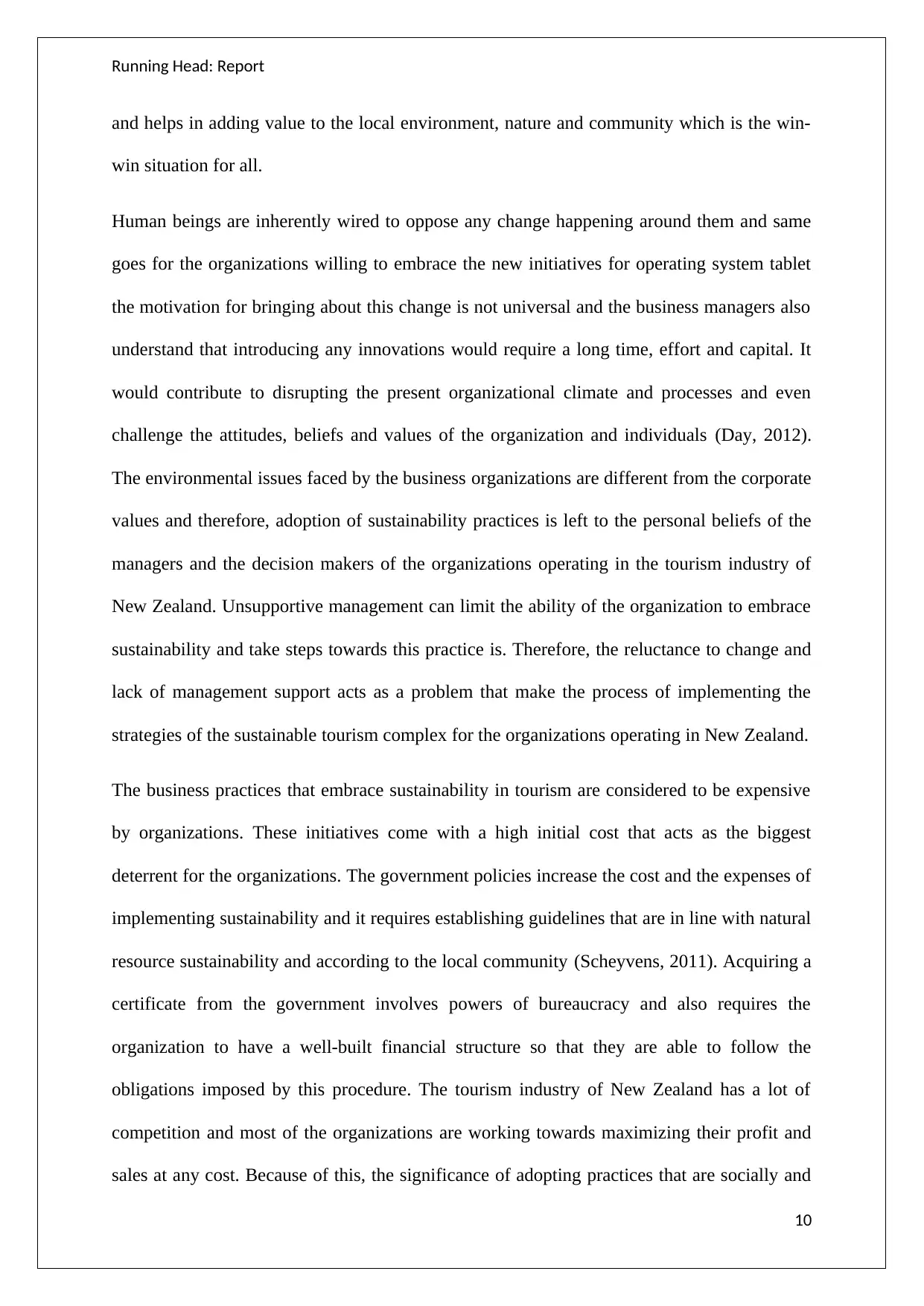
Running Head: Report
and helps in adding value to the local environment, nature and community which is the win-
win situation for all.
Human beings are inherently wired to oppose any change happening around them and same
goes for the organizations willing to embrace the new initiatives for operating system tablet
the motivation for bringing about this change is not universal and the business managers also
understand that introducing any innovations would require a long time, effort and capital. It
would contribute to disrupting the present organizational climate and processes and even
challenge the attitudes, beliefs and values of the organization and individuals (Day, 2012).
The environmental issues faced by the business organizations are different from the corporate
values and therefore, adoption of sustainability practices is left to the personal beliefs of the
managers and the decision makers of the organizations operating in the tourism industry of
New Zealand. Unsupportive management can limit the ability of the organization to embrace
sustainability and take steps towards this practice is. Therefore, the reluctance to change and
lack of management support acts as a problem that make the process of implementing the
strategies of the sustainable tourism complex for the organizations operating in New Zealand.
The business practices that embrace sustainability in tourism are considered to be expensive
by organizations. These initiatives come with a high initial cost that acts as the biggest
deterrent for the organizations. The government policies increase the cost and the expenses of
implementing sustainability and it requires establishing guidelines that are in line with natural
resource sustainability and according to the local community (Scheyvens, 2011). Acquiring a
certificate from the government involves powers of bureaucracy and also requires the
organization to have a well-built financial structure so that they are able to follow the
obligations imposed by this procedure. The tourism industry of New Zealand has a lot of
competition and most of the organizations are working towards maximizing their profit and
sales at any cost. Because of this, the significance of adopting practices that are socially and
10
and helps in adding value to the local environment, nature and community which is the win-
win situation for all.
Human beings are inherently wired to oppose any change happening around them and same
goes for the organizations willing to embrace the new initiatives for operating system tablet
the motivation for bringing about this change is not universal and the business managers also
understand that introducing any innovations would require a long time, effort and capital. It
would contribute to disrupting the present organizational climate and processes and even
challenge the attitudes, beliefs and values of the organization and individuals (Day, 2012).
The environmental issues faced by the business organizations are different from the corporate
values and therefore, adoption of sustainability practices is left to the personal beliefs of the
managers and the decision makers of the organizations operating in the tourism industry of
New Zealand. Unsupportive management can limit the ability of the organization to embrace
sustainability and take steps towards this practice is. Therefore, the reluctance to change and
lack of management support acts as a problem that make the process of implementing the
strategies of the sustainable tourism complex for the organizations operating in New Zealand.
The business practices that embrace sustainability in tourism are considered to be expensive
by organizations. These initiatives come with a high initial cost that acts as the biggest
deterrent for the organizations. The government policies increase the cost and the expenses of
implementing sustainability and it requires establishing guidelines that are in line with natural
resource sustainability and according to the local community (Scheyvens, 2011). Acquiring a
certificate from the government involves powers of bureaucracy and also requires the
organization to have a well-built financial structure so that they are able to follow the
obligations imposed by this procedure. The tourism industry of New Zealand has a lot of
competition and most of the organizations are working towards maximizing their profit and
sales at any cost. Because of this, the significance of adopting practices that are socially and
10
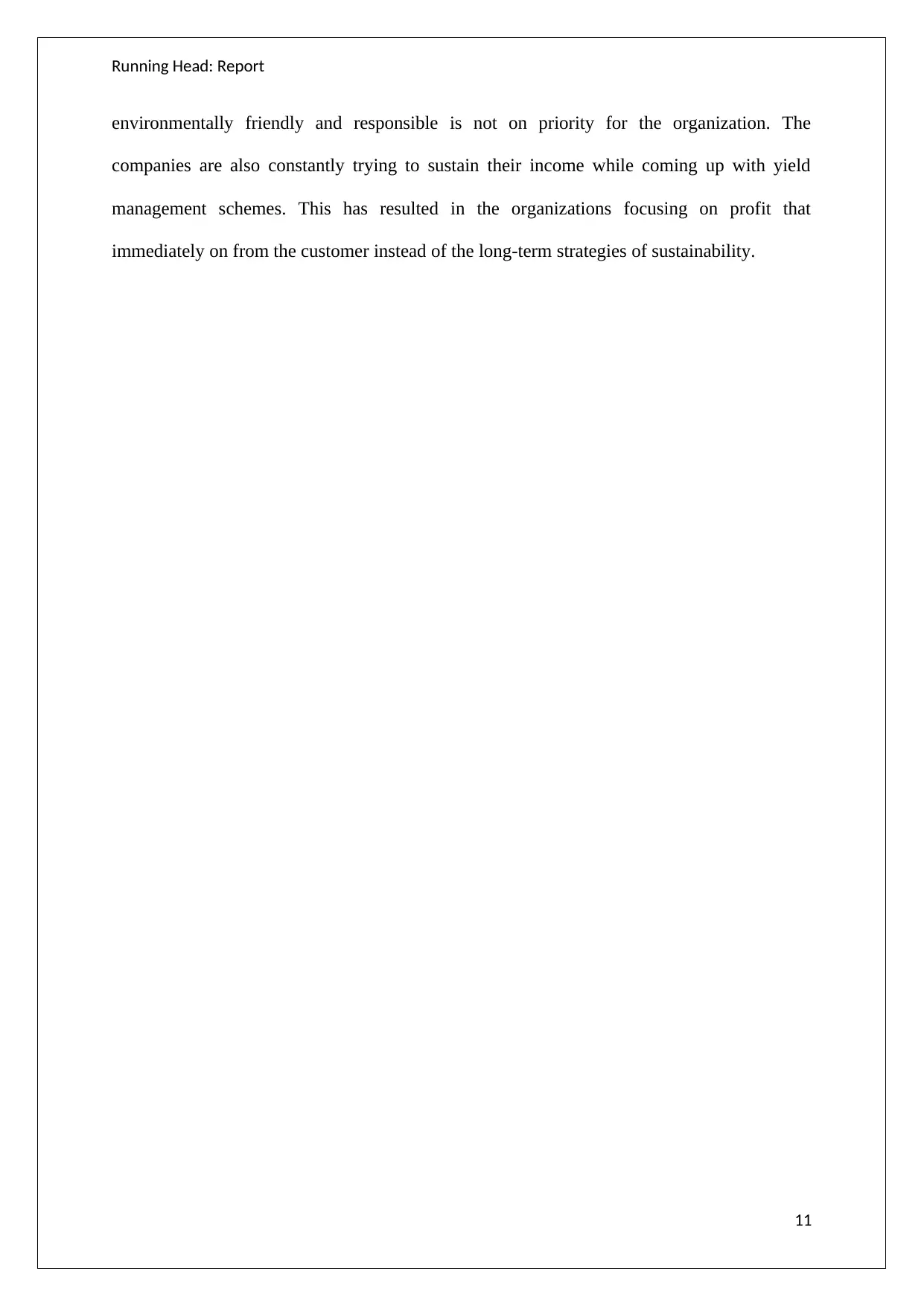
Running Head: Report
environmentally friendly and responsible is not on priority for the organization. The
companies are also constantly trying to sustain their income while coming up with yield
management schemes. This has resulted in the organizations focusing on profit that
immediately on from the customer instead of the long-term strategies of sustainability.
11
environmentally friendly and responsible is not on priority for the organization. The
companies are also constantly trying to sustain their income while coming up with yield
management schemes. This has resulted in the organizations focusing on profit that
immediately on from the customer instead of the long-term strategies of sustainability.
11
⊘ This is a preview!⊘
Do you want full access?
Subscribe today to unlock all pages.

Trusted by 1+ million students worldwide
1 out of 24
Your All-in-One AI-Powered Toolkit for Academic Success.
+13062052269
info@desklib.com
Available 24*7 on WhatsApp / Email
![[object Object]](/_next/static/media/star-bottom.7253800d.svg)
Unlock your academic potential
Copyright © 2020–2026 A2Z Services. All Rights Reserved. Developed and managed by ZUCOL.
